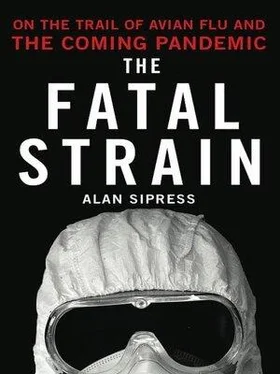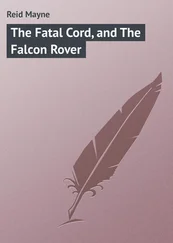The very day that interview was published, Nidom broke ranks and announced his findings to the competing Kompas newspaper. He said 10 million chickens had succumbed to the disease over the previous three months. He said he had forwarded at least a hundred samples from infected birds to the central government as proof.
A day later, the agriculture ministry publicly confirmed the outbreak. But already the disease had spread across Java and on to the islands of Bali, Borneo, and Sumatra. The plague was bleeding from the commercial sector into backyard holdings, infecting tens of millions of free-range chickens that had been left unprotected. “It was too late. The virus was everywhere,” Nidom recalled.
Though scientists concluded that the virus had been introduced into Indonesia on only a single occasion, the disease would go on to infect at least thirty-one of the country’s thirty-three provinces, transmitted by the trade in poultry and poultry products. The virus would eventually leap to people, and by the end of 2005, Indonesia was registering more human cases than any other country. WHO and other international agencies would grow ever more exasperated with Indonesia’s continuing negligence. “It is important for the Indonesian government, in its interest and the interest of the international community, to take the necessary political decision” to tackle the virus, urged Bernard Vallat, head of the World Organization for Animal Health, in comments he would make nearly three years after the outbreak started. “Indonesia is a time-bomb for the region.” He could have added, “for the world.”
As soon as Nidom went to the media with his findings, the national poultry commission fired him from his advisory post. But he continued to press. Nidom grew increasingly nervous about the prospect of the epidemic spreading to people in Indonesia, a country with an impoverished health-care system and the largest population in the region. He arranged a conference in late 2004 at his university to discuss the disease, inviting four of the world’s premier influenza researchers, from the United States, Japan, Hong Kong, and mainland China. Yet shortly before its scheduled date, he told me, a senior agriculture official contacted the head of Nidom’s institute and ordered that foreign participants be barred. Officials threatened to have police break up the conference if it went ahead as planned. Nidom canceled the program altogether.
The Indonesian government also turned its ire on foreigners, including WHO staff, who spoke out of turn. The agency’s team leader for avian flu in Indonesia told the media in 2006 that human cases would continue as long as the disease was circulating widely among birds. This was not only WHO’s official position but basic science. But the government subsequently expelled him from the country. Though the health ministry never supplied a formal explanation, some WHO officials concluded that his remarks had contributed to his ouster.
A similar fate befell Naipospos, the country’s animal-health director. Commonly known as Dr. Tata, she was passionate and opinionated, with dark eyes that seemed both probing and vulnerable behind her thick glasses. She was a rare professional in the ranks of the agriculture ministry. She had earned a master’s degree from England, a doctorate in veterinary epidemiology from New Zealand, and widespread respect from disease experts at WHO and other international agencies. Naipospos first disclosed the government’s cover-up in an interview she gave me in early 2005 for the Washington Post. She repeated her allegations five months later but this time in Indonesian, in an interview with the Kompas newspaper. A day after the article was published, the agriculture ministry fired her.
Agriculture Minister Anton Apriyantono told me he dismissed Naipospos because he was not happy with her handling of bird flu and her working relationship with top ministry officials. This explanation outraged Naipospos. She countered that she had been sacrificed by the ministry not only because of her candor but because of party politics. With the minister’s upstart party trying to cast itself as a force for government reform, Apriyantono sought to tar her with the failures of his department, even accusing her of corruption. That charge was never pursued by prosecutors. And UN officials publicly criticized the government for ousting its most respected animal-health expert at the height of a crisis.
Naipospos alleged that bird flu had never been a priority in the agriculture ministry. Agriculture officials had not even tapped available emergency funds to pay for disease control. “I talked to the minister about it many times,” she recalled. “He said a disease outbreak is not a national emergency, not a disaster.”
Naipospos was ultimately vindicated when she was named to a new presidential commission established in 2006 to oversee the government’s avian flu policies. The body’s primary charge was to coordinate the efforts of rival ministries, in particular health and agriculture. But it, too, proved impotent. The commission received little support from the ministries, and even its own director was just a part-time appointee. Indonesia would continue to be singled out by senior UN officials for “the lack of a national strategy, the lack of political involvement.” Still, the avian flu commission made a small contribution to setting the record straight. In a press release three years after the disease erupted, the commission formally acknowledged that the virus had indeed first made landfall in Indonesia in the middle of 2003, many months before the government had admitted.
The trip that took Margaret Chan to Beijing’s Great Hall of the People was a delicate mission. Just three weeks before, in early November 2006, the former Hong Kong health director had been elected WHO’s new director general. She was to replace Lee Jong Wook, who had died suddenly after brain surgery. Chan’s election had been hotly contested, with the former Hong Kong public health director besting ten other candidates. China had sponsored Chan’s candidacy, lobbying hard for her, and saw the contest as a measure of the country’s growing clout on the world stage. When months of quiet pressure and diplomatic horse trading were finished, the Chinese government had lined up far more than enough votes, including crucial backing from the United States, and Chan became the first Chinese national ever to hold such a high post at a United Nations agency. Now she was visiting China’s monumental seat of government to personally thank President Hu Jintao. “I will remember the support given to me by the country in my heart forever,” Chan told him.
But she also had more sensitive matters to raise. Beijing had stopped supplying flu samples to WHO’s affiliated labs. No human specimens had been shared since the spring, and the most recent was from a year-old case. The newest samples from infected birds were also a year old. Flu viruses are notoriously mercurial, and China’s defiance of repeated international appeals was keeping WHO from staying abreast of the virus’s twists and turns. This was undercutting international scientific efforts to understand the behavior of this unusual virus and anticipate its further evolution. At stake was the timely development of vaccines and drugs tailored to the prevailing strains.
In the days after Chan was elected, reporters had pressed her on whether she would stand up to the Chinese government. One commentator in her hometown of Hong Kong even asked whether she’d be simply a “foot soldier for Beijing.” Chan insisted that her allegiance was to WHO. “First and foremost, now that I have been elected as director-general, I will no longer wear my nationality on my sleeve. I’ll leave it behind,” she replied. As she met with Hu, skeptics were watching for a sign of such independence.
Читать дальше











